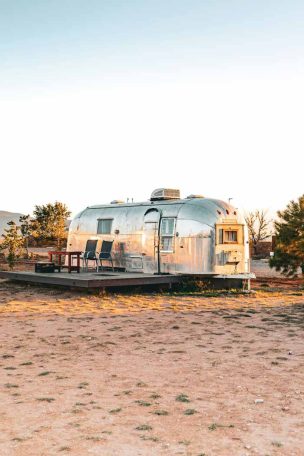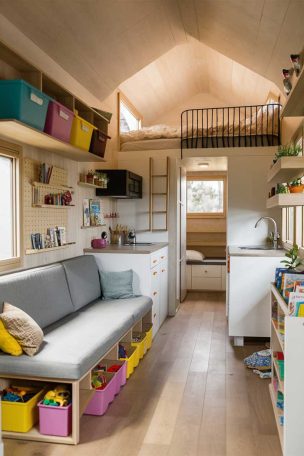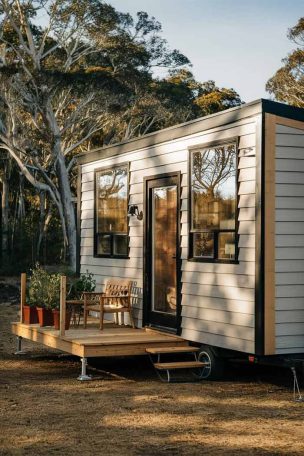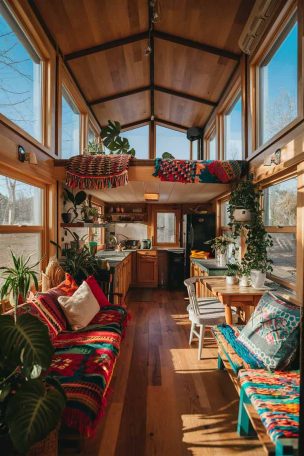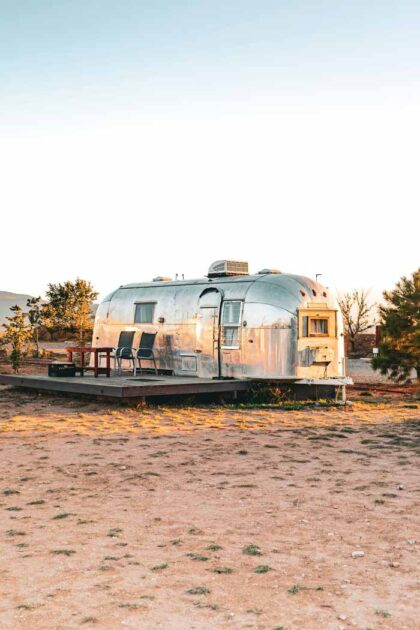In recent years, the allure of downsizing and embracing a more mobile lifestyle has captured the imagination of many. Two popular options that have emerged are tiny house living and RV life.
While both offer alternatives to traditional housing, they each come with their own unique set of characteristics, advantages, and challenges.
Whether you’re a wanderlust-stricken adventurer or someone looking to simplify their life, understanding the nuances between tiny houses and RVs is crucial. Let’s dive into the world of compact living and explore what each option offers.
Design and Functionality
When it comes to design and functionality, tiny houses and RVs take pretty different approaches. Let’s break it down:
Tiny Houses
Tiny houses are all about personalization. If you’ve ever dreamed of designing your own space from the ground up, a tiny house might be your perfect canvas. These diminutive dwellings offer extensive customization options, allowing you to create a home that’s truly yours.
Working with tiny house builders is often a collaborative process. You can choose everything from the layout and materials to the finishes and built-in furniture. Want a cozy reading nook or a custom-designed workspace? In a tiny house, it’s all possible.
One of the big draws of tiny houses is their focus on sustainability. Many tiny homeowners opt for eco-friendly and lightweight materials, embracing a minimalist lifestyle that treads lightly on the earth. It’s not uncommon to see tiny houses incorporating reclaimed wood, solar panels, or composting toilets.
Size-wise, tiny houses typically clock in at less than 400 square feet, excluding lofts. Don’t let that fool you, though – clever design and optimal use of vertical space can make these small homes feel surprisingly spacious.
RVs
RVs, on the other hand, are built with mobility in mind. Their aerodynamic, lightweight construction makes them ideal for frequent travel. They come in a range of sizes, from compact 16-footers to luxurious 45-foot behemoths.
One of the coolest features of many RVs is their slide-out mechanisms. These nifty additions can significantly increase your living space when you’re parked, giving you the best of both worlds – compact for travel, spacious for living.
While RVs offer less customization than tiny houses, they make up for it with clever, space-saving features. Multi-functional furniture and ingenious storage solutions are the norm in RV design.
The big advantage of RVs? They’re ready to go. Unlike tiny houses, which often require a lengthy build process, you can purchase an RV and hit the road almost immediately. And with a wide range of models available, you’re likely to find one that suits your needs without the wait.
Lifestyle and Living Conditions
Your choice between a tiny house and an RV will significantly impact your lifestyle. Let’s explore what life might look like in each:
Tiny House Living
Tiny houses offer a unique blend of permanence and potential mobility. While some are built on permanent foundations, others are constructed on wheels, allowing for relocation. However, it’s worth noting that tiny houses aren’t really designed for frequent travel. They’re more about finding your spot and settling in, at least for a while.
One of the most exciting developments in the tiny house world is the emergence of tiny house communities. These neighborhoods offer a sense of belonging and shared resources, perfect for those who want to downsize without sacrificing social connections.
That said, tiny house living comes with its share of challenges. Zoning laws and building regulations can be a real headache, with many areas still unsure how to classify these unique dwellings. You might find yourself facing restrictions on where you can park or live in your tiny house.
RV Living
RV life is all about adventure and flexibility. These homes-on-wheels are designed for those who want to explore, offering the freedom to change your backyard view whenever the mood strikes.
One of the big perks of RV living is the established infrastructure that supports it. RV parks across the country offer amenities like electricity hookups, water connections, and waste management facilities. Many also provide social activities, making it easy to meet fellow travelers and form a community on the go.
From a legal standpoint, RVs have it easier than tiny houses. They’re classified as vehicles, which means clearer regulations and easier registration and insurance processes. However, this can also mean limitations on how long you can stay in one place, which might be a drawback if you’re looking for a more permanent setup.
Cost and Maintenance
When it comes to your wallet, there are some significant differences between tiny houses and RVs:
Tiny Houses
Tiny houses often require a substantial initial investment. Custom construction isn’t cheap, and if you’re opting for high-end materials or fancy finishes, costs can add up quickly. However, they’re built to last, using residential-grade materials that can withstand full-time living for many years.
Maintenance-wise, tiny houses are similar to traditional homes, just on a smaller scale. You’ll need to keep up with typical home maintenance tasks, but the reduced size means less work overall. Plus, many tiny homeowners enjoy the DIY aspect, tackling repairs and improvements themselves.
RVs
RVs offer more flexibility in terms of initial cost. You can opt for a brand-new, top-of-the-line model, or hunt for a bargain in the extensive used market. However, it’s worth noting that RVs typically depreciate faster than tiny houses, which might impact their long-term value.
Maintenance for RVs can be more specialized. While some tasks are DIY-friendly, others require professional servicing, especially when it comes to the vehicle components or complex systems like slide-outs.
Comfort and Livability
At the end of the day, your tiny dwelling needs to be comfortable. Here’s how tiny houses and RVs stack up:
Tiny Houses
Tiny houses often feel more like “real” homes. With their residential construction and customizable interiors, they can provide a sense of warmth and permanence that many find comforting.
Climate control is another area where tiny houses shine. Their superior insulation makes them more comfortable in extreme weather, whether you’re facing a scorching summer or a frigid winter.
The ability to customize every aspect of a tiny house means you can create a space that’s ergonomically perfect for you. Want full-size appliances or a bathtub? In a tiny house, that’s entirely possible.
RVs
RV living is all about efficient use of space. Every nook and cranny serves a purpose, with many features designed to be multi-functional. While this can take some getting used to, many RV dwellers come to appreciate the simplicity and organization it brings to their lives.
One of the big advantages of RVs is their travel-readiness. Everything is designed for life on the move, from secure storage solutions to quick setup and breakdown processes.
However, RVs can struggle in extreme weather conditions. Their lighter construction and less robust insulation can make them less comfortable in very hot or cold climates.
Legal and Regulatory Considerations
Navigating the legal landscape can be one of the trickiest aspects of alternative living. Here’s what you need to know:
Tiny Houses
Tiny houses exist in a bit of a legal grey area in many places. Zoning laws often don’t know quite what to make of them – are they houses? Are they mobile homes? This uncertainty can lead to challenges in finding a place to legally park and live in your tiny house.
Building codes can also be a hurdle. Many areas require homes to meet certain size requirements that tiny houses simply don’t. However, some tiny house builders are now offering RVIA (Recreational Vehicle Industry Association) certified models, which can help with acceptance in some areas.
RVs
RVs have a clear legal advantage. They’re classified as vehicles and have an established legal framework governing their use. This makes it much easier to find places where you can legally park and stay.
However, RV living comes with its own set of restrictions. Many campgrounds and RV parks have limits on how long you can stay, which can be problematic if you’re looking for a more permanent setup. Some areas also have restrictions on using an RV as a full-time residence, so it’s important to research local laws.
Environmental Impact
For many, the appeal of downsizing is tied to a desire to reduce their environmental impact. Here’s how tiny houses and RVs compare:
Tiny Houses
Tiny houses are often seen as a more environmentally friendly option. Their small size means they use fewer resources to build and maintain. Many tiny house dwellers also incorporate sustainable features like solar panels, rainwater collection systems, or composting toilets.
The durability of tiny houses also contributes to their sustainability. Built to last, they have a longer lifespan than many RVs, reducing the need for replacement and the associated resource use.
RVs
The environmental impact of RV living largely depends on how you use it. Frequent travel means higher fuel consumption and emissions. However, the RV industry is making strides in developing more eco-friendly technologies, including more fuel-efficient vehicles and solar power systems.
RVs excel in efficient use of resources. Their compact design naturally encourages conservation of water and energy. However, waste management can be more challenging when you’re on the move, requiring careful planning and responsible practices.
Conclusion
Choosing between a tiny house and an RV ultimately comes down to your personal priorities and lifestyle goals. If you value customization, sustainability, and a more home-like feel, a tiny house might be your best bet. On the other hand, if you prioritize mobility, ease of setup, and the ability to travel frequently, an RV could be the perfect fit.
Remember, these aren’t mutually exclusive options. Some people even opt for hybrid solutions, combining elements of both lifestyles. The beauty of alternative living is that you can tailor it to your needs.
Whichever path you choose, embracing a downsized, potentially mobile lifestyle can offer freedom, simplicity, and a chance to focus on what truly matters to you. So whether you end up in a custom-built tiny home or cruising the country in an RV, here’s to living large in a small space!
